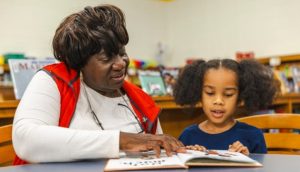
As we begin another school year, it is more important than ever to explore ways for generations to engage in mutual learning opportunities that result in positive educational outcomes, meaningful relationships, and greater empathy across ages. Schools can be natural settings for intergenerational interaction to occur, yet the lingering effects of the COVID-19 pandemic, widespread ageism, and concerns about school safety have created barriers to school-based programming. This issue highlights examples of intergenerational initiatives that focus on PreK and K-12 grade education, including classrooms in senior living facilities, intergenerational schools, adult day care in a high school, and programs that engage older adults as tutors and mentors.
Bridging Generations Through Learning
“Intergenerational learning breaks down age barriers, creating powerful educational experiences that enrich both young and old participants. This dynamic approach to education doesn’t just bridge generational gaps – it transforms them into opportunities for deep, meaningful learning that benefit entire communities.”
A recent TeachFind article “Bridging Generations: How to Create Powerful Learning Partnerships in Your Classroom” explores how connecting students with older adults fosters empathy, communication, and cultural preservation while enhancing academic outcomes. Read the full article on TeachFind.
WEBINAR – Join us 11/6/25
K–12 Schools as Hubs for Intergenerational Connection Webinar
How can K–12 schools become spaces where generations learn from and support one another? Join us Thursday, November 6, 2025, from 12:00 – 1:00 PM EST (9:00 – 10:00 AM PST) for an engaging webinar highlighting innovative school models that connect students and older adults in meaningful ways.
Learn how a co-located high school and senior center in Swampscott, Massachusetts, fosters relationships across age and culture, how a high school in Hudson, New Hampshire, that houses an adult day care center prepares students for careers in health and human services while enriching the lives of older adults, and how older adult volunteers in Los Angeles, California help elementary students strengthen their reading and math skills.
Explore how schools can serve as vibrant spaces for intergenerational connection and shared purpose. Attendance is free, but all participants must register in advance. The webinar will be recorded, and a link to the recording will be shared with everyone who registers. Register Today
SHARED SITE HIGHLIGHT
Swampscott High School and Swampscott Senior Center (Swampscott, MA)
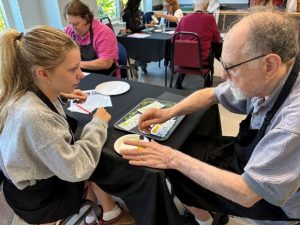
In Swampscott, Massachusetts, school and community leaders pooled their resources in 2007 to build a high school and senior center, co-located in the same building but with separate entrances. During the pandemic, there was limited interaction between students and senior center participants. However, in 2021, the intergenerational program was revitalized. There are now multiple opportunities for students and older adults to learn together. These include:
Room of Color (ROC) Partnership: Every year, the Swampsott Senior Center, whose participants are primarily white, partners with an affinity group at the high school composed of students of color. Over the past few years, they have worked together on several projects, including a documentary in 2022 to commemorate Black History Month, a community quilt representing what Black History meant to each participant that went on “tour” throughout town, and a community lunch and learn that featured a panel of students and Senior Center members. The Center also held an intergenerational book club in partnership with the high school’s Girl’s Group that supports female students of color and their allies.
Bridging Generation: This class, an elective based on the Opening Minds Through Art (OMA) curriculum, is offered to students twice a year and allows for all the training and implementation of the OMA program to occur during class time. Students become trained Dementia Friends as well as learn about normative aging, ageism, and social policies that impact all ages.
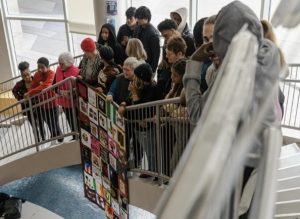
Senior Center Internship: High School seniors receive credit for interning during a designated class period for the entire school year. Interns are at the Center 2-3 times a week for 75 minutes and help with all aspects of the Center operations.
Intergenerational Current Events Group: Members of the community service club at the High School and Senior Center participants meet monthly to discuss mutually agreed upon topics related to current events.
Gay Straight Alliance Resource Connection: The High School and Senior Center hosted a lunch and learn to educate Senior Center members on pronouns and gender identity.
Discovery Point Program: Students with developmental and intellectual disabilities ages 18-22 assist in the operational functions of the Center, helping to set up rooms, maintain the coffee station, and bake desserts that are served during lunch.
For more information, contact Sabrina Clopton: sclopton@swampscottma.gov
Videos:
INTERGENERATIONAL LEARNING: Pre-K to 12
Pre-School and K
Grace Living Center (Norman and Jenks, OK)
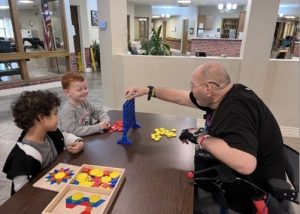
Grace Living skilled nursing facilities in Jenks and Norman, Oklahoma, have partnered with their local school districts to create intergenerational classrooms for pre-K and K students. The Jenks program was developed in 1999; the Norman classrooms were built in 2019.
These unique classrooms enable students to experience daily interactions with the center’s residents, known as “Grandfriends.” Grandfriends serve as reading buddies with students and engage in activities such as Music and Movement Class, sing-alongs, dramatic play, and shared studies. The teachers and Activity Directors meet monthly with the Intergenerational School Liaison to plan age/ability-appropriate activities. The academic curriculum is consistent with local Pre-K and K programs and provides real-world lessons in empathy, social history, and conversation skills. Additionally, every Wednesday, children and older adults gather in a common area for an ice cream social. Students are supervised at all times by a certified teacher or the Grace Living Center School Liaison during daily interactions with residents.
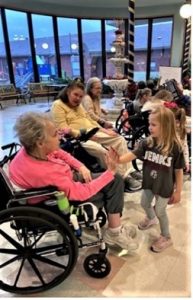
For further information about the Norman, OK program, contact Lori Branson: lbranson99@gmail.com
For further information about the Grace Jenks program, contact Mariah Bellamy: mariah.bellamy@gracejenks.com
Articles:
- https://www.normanps.org/article/2287387
- https://www.tulsapeople.com/lifestyle/jenks-public-schools-students-learn-alongside-senior-residents-at-grace-skilled-nursing-and-therapy/article_0364255b-bf12-4546-a8ba-b665891ead0c.html
Video: https://youtu.be/s-r9eIcpdj8?si=iw9ySIt_KGdxd6YH
All Seasons Pre-School ( Eagan, MN)
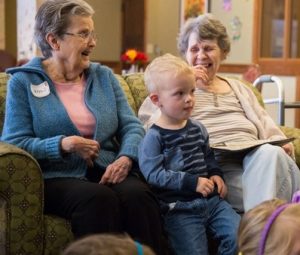
The All Seasons Pre-School, located inside the four-story Lexington Pointe Senior Residence in Eagan, Minnesota, provides a model early learning experience that meets children’s developmental needs while fostering meaningful relationships with older adults. Every week, the 50 pre-schoolers interact formally and informally with over 200 residents in both Memory Care and Independent Living. Each classroom is paired with a Memory Care wing where they participate in a variety of age-appropriate activities planned by the teachers. Children also interact with independent living residents in a communal room, engaging in activities such as sing-alongs, arts and crafts, and story acting. In addition, each classroom has a “Grandma/Grandpa” reader who comes once a week to read and interact with the students.
For more information, contact Joanne Esser at joanne.esser@allseasonspreschool.net
Video: https://www.allseasonspreschool.net/about
Connecting the Generations (Tel Aviv, Israel)
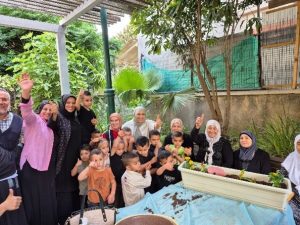
Seven years ago, twelve volunteers with expertise in education, gerontology, and organizational management came together with a shared vision: to strengthen intergenerational connections in a professional and impactful way in Tel Aviv. This vision led to the creation of Connecting the Generations, now active in various municipalities across Israel.
One particularly interesting initiative is taking place in the north of Israel, in the Arab municipality of Um El Fahem, supported in part by Social Security funds. Every other week, preschool children walk up a steep hill to visit an adult day care center, where they engage in shared activities with older adults. At the heart of this program is mutuality, older adults are not only recipients, but active participants. In the organization, programs are guided by three intergenerational managers with strong involvement from the local municipality. All materials are provided in Hebrew and Arabic, ensuring full accessibility and cultural relevance.
This project demonstrates that intergenerational connection can bridge not only between the generations but also geographies, religions, and cultures, offering a powerful model for inclusive, community-based engagement.
For more information, contact Sharon Walker-Zaks: sharonwalker888@gmail.com
Elementary and Middle School
Rashi School & New Bridge on the Charles (Dedham, MA)
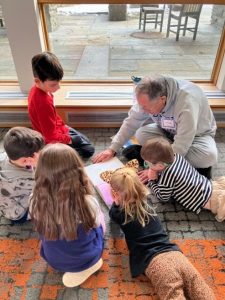
In Dedham, Massachusetts, the Rashi School and Hebrew SeniorLife’s NewBridge on the Charles senior living community share a 162-acre campus. Over the course of their Pre-K to Grade 8 education, every student experiences multiple touch points with NewBridge residents, and many form lasting relationships with their senior neighbors.
During any given week, students might volunteer with residents who have memory loss through Making Memories, celebrate Jewish holidays, create and facilitate a thematic activity through Mitzvah Makers, or simply spend quality time reading together. Students interact with residents in traditional assisted living, independent living, long-term care, and memory care. Students learn about the lived experiences of NewBridge residents: their stories, their families, and their day-to-day life. In addition, independent living residents volunteer regularly with younger students at the school.
For more information, contact Hannah Silver: HannahSilver@hsl.harvard.edu
Video: https://www.hebrewseniorlife.org/services/programs/intergenerational-programs
The Intergenerational School (Cleveland, OH)
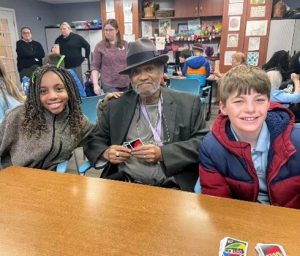
The Intergenerational Schools, two high-performing K–8 public charter schools in Cleveland, Ohio, serve families and their surrounding communities with an award-winning educational model grounded in the principles of lifelong learning and building relationships. Started in 2000, the mission of the Intergenerational Schools is to connect, create, and guide a multigenerational community of lifelong learners.
The schools have two flagship intergenerational programs: the Learning Partner program, where adults (usually older adults) come into the schools to read, play, and learn with students, and the Intergenerational Visits program, where each classroom of students “adopts” the residents at a partner elder care facility and visits them monthly for co-learning activities. Both programs have always been heavily centered on literacy and fostering a love of reading.
Other popular project-based intergenerational learning projects have emerged from individual interests that align with curricular and academic standards. Multigenerational groups have studied local ecosystems, researched the Holocaust together, coauthored a book about local environmental activism, put on a theatrical production of Peter Pan, and learned about the civil rights movement.
For more information, contact Brooke King: BKing@IGSchool.org
Video: https://www.youtube.com/watch?v=To34hTEXM10
Newsletter: https://igschools.org/lifelong-learners
Gaithersburg Beloved Community Initiative (Gaithersburg, MD)
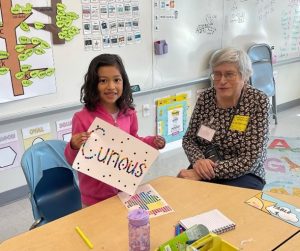
Gaithersburg Beloved Community Initiative nurtures intergenerational relationships and promotes social justice through programs with youth, families, and older adults in the city of Gaithersburg, Maryland, including mentoring programs in both elementary and middle schools. In elementary schools, older volunteers and students interact one-on-one or in small groups, reading together, journal writing, creating, and working on collaborative projects. This structured program, facilitated by staff, focuses on student social-emotional development, building resilience, and developing literacy skills. It takes place after school at two Title I elementary schools throughout the school year.
The Elementary and Middle School Mentoring Through Art program (grades 5-8) engages students and volunteers in the art-making process to facilitate dialogue, collaboration, and reflection. The goal is to provide students with a high-level art experience resulting in opportunities to develop new skills, increase confidence, and nurture cognitive, social, and personal growth.
For more information, contact interim director Anne Ellestad: anne@gaithersburgbelovedcommunity.org
Newsletter: https://mailchi.mp/11d2261a8ea6/gbci-august-2025-newsletter-10147955
SAGE (Senior Adults for Greater Education) (Bucks County, PA)
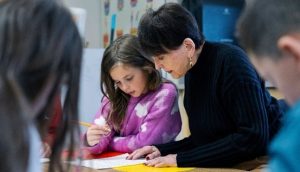
For over 28 years, S.A.G.E. (Senior Adults for Greater Education), a 501 c 3 organization, has matched community members, aged 55+, with volunteer opportunities in the Bucks and Montgomery County, Pennsylvania school districts. Currently, 110 older adults volunteer in 22 schools, averaging two hours per week.
All volunteers are vetted and trained on topics from reading comprehension to special education. A teacher in each school serves as the point person for SAGE. A manual, customized for each school, is given to volunteers to clarify expectations and responsibilities. All volunteers sign a contract to formalize and acknowledge their understanding of the procedures and policies. Although most volunteers are placed in elementary school classrooms, twelve people are working with ESL students in a middle school. A new partnership with the Bucks Learning Cooperative will create opportunities for volunteers to work with high school students who are being homeschooled this year.
For more information, contact Beryl Katz: beryl@beasage.org
Article: https://www.aarp.org/family-relationships/how-to-become-a-mentor/
Generation Xchange (Los Angeles, CA)
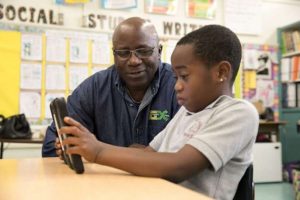
The Generation Xchange (GenX) Program, a partnership between the UCLA Department of Medicine and the L.A. Unified School District in Los Angeles, California, places older community volunteers (50+) in grades K-3 elementary school classrooms to help students improve their academic and behavioral outcomes, while promoting greater health and wellness outcomes in at-risk older adults. Volunteers receive 30 hours of training in early literacy, phonics, reading comprehension, mathematics, social-emotional support, and stress management. They spend 10 hours per week helping students individually and in small groups improve their English language and math skills. A monthly stipend is provided. The program is currently operating in 10 schools in South Los Angeles.
Grandpas United (White Plains, NY)
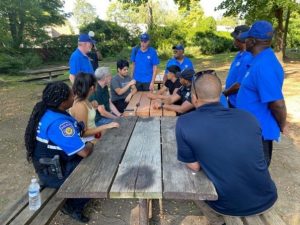
Grandpas United, founded in 2018 as a program of the White Plains Youth Bureau, recruits, trains, and supports older men to serve as mentors to children and youth in Westchester County, New York. Through regular, bi-weekly visits to local elementary schools, mentors offer encouragement and compassion to groups of young boys, many of whom lack father figures. Older men have also served as mentors to high school boys, engaging in discussions about goal setting, career planning, problem-solving, leadership, financial literacy, and principles of manhood. The program also offers scholarships for community service work. During the summer, Grandpas coach Summer Employment Program students, helping them develop confidence and workplace readiness. In 2023, the Jump Start for Dads program was created to support and inspire fathers and expectant fathers.
For more information, contact Jim Isenberg: izofam1545@gmail.com or Frank Williams: fwilliams@whiteplainsny.gov
Videos:
- https://www.npr.org/2025/03/12/nx-s1-5323125/grandpas-united-creates-volunteer-opportunities-for-the-benefit-of-young-and-old
- https://grandpasunited.org/cbs-news-grandpas-united-retirees-mentor-kids-at-school/
OASIS Tutoring (22 U.S. Cities)
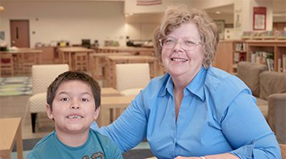
Oasis Tutoring is a volunteer program that pairs older adults with K–3 students to deliver mentoring and tutoring in literacy, providing one-on-one support and attention for the duration of the school year. The program has consistently improved reading levels, academic performance, and children’s attitudes toward learning. Oasis tutors use a six-step approach to literacy designed by educators that emphasizes improved reading, speaking, listening, and writing. Tutors work with the same child each week for a year, fostering strong relationships.
Oasis Intergenerational Tutoring has reached more than 525,000 children over the last 36 years. In 2025, Oasis tutors are serving in 380 schools in 72 districts across the country. More than 2,700 Oasis tutors volunteer in 15 different states in over 22 U.S. cities.
For more information, contact Mary Click: mclick@oasisnet.org
AARP Foundation Experience Corps (18 U.S. Communities)

AARP Foundation Experience Corps is an evidence-based intervention that mobilizes older adults as tutors in public schools. Volunteers aged 50+ work closely with students in underserved areas, improving literacy outcomes while simultaneously creating bonds with young learners. Currently, the Experience Corps program operates in 18 communities across the United States.
As part of a network of branches and affiliates, each AARP Foundation Experience Corps site operates one of three tutoring models: one-to-one, small group, and literacy assistance (where volunteers tutor and help teachers with classroom-wide activities). Local community organizations implement the program with the support of the AARP Foundation Experience Corps national office.
During the 2023-2024 school year, 1,284 senior volunteers helped 3,659 kids to become better readers before the end of their third-grade year.
Article: https://www.aarp.org/experience-corps/our-impact/experience-corps-research-studies.html
High School
Whatcom Intergenerational High School (Bellingham, WA)
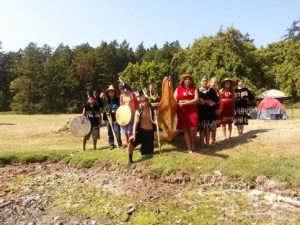
Whatcom Intergenerational High School (WIHS) is a small charter high school in Bellingham, WA, that intentionally brings generations together to support one another, build community, and promote youth leadership. Located within a shopping mall, the school has 118 students from diverse backgrounds, including those from the Lummi Nation. Elders are a consistent presence at WIHS, offering mentorship and support in and outside the classroom. They bring life experience and cultural knowledge to collaborative learning experiences with students.
In partnership with Whiteswan, a local environmental organization, students and elders work together as stewards of the environment. The focus on place-based experiential learning provides students with opportunities to conduct research and engage in service-learning activities related to food sovereignty, Truth and Reconciliation, and the restoration of ancestral sites.
Place-based programs include a one-week Learning from the Homeland Language Camp involving indigenous elders and students. The curriculum reflects Lummi values and practices, including the importance of valuing ancestral knowledge and promoting wellness. A new 13 Moons Planetarium in the high school creates immersive experiences to explore WHO I AM and WHERE I AM FROM activities that connect students and elders to their homelands.
For more information, contact Chimere Hackney: chimere.hackney@intergenerational.school
Video: https://drive.google.com/file/d/1Nt2Pl1dQIfYdqGeJwF5ADYjHln5PFlpF/view?usp=sharing
Elder Tech Academy (Bay Area, CA)

ElderTech Academy is an intergenerational technology program that pairs interested older adults and tech-savvy high school students in the Bay Area of California to further their understanding of and skills with mobile technologies. Students are recruited from area high schools and meet with older adults at public libraries, senior centers, and other community sites.
Following the pandemic, ElderTech Academy established a paid summer internship program through its Career Training Department. In 2023, to address the growing interest in AI among both older adults and high school students, ElderTech Academy launched the Imagination Project. Designed as a co-learning experience, participants are introduced to a variety of AI tools (e.g., Midjourney and ChatGPT), which enable them to create extraordinary images and stories. Working individually and in small groups, older adults and youth explore what they can do with AI and how it can be applied to their daily lives. Working together, their preconceived notions and stereotypes of each other are reduced, and meaningful bonds and relationships are formed.
For more information, contact Steve Lipson: sblipson@comcast.net
Sages and Seekers (Los Angeles, CA)
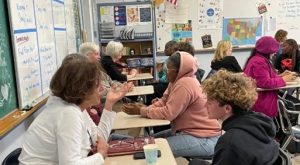
Sages & Seekers, a program of ONEgeneration, facilitates intergenerational relationships between older adults (60+) “Sages” and students (12-24)”Seekers.” Their 8-Week Signature Program is offered online and in-person throughout a variety of locations, including schools, senior centers, and other community facilities. Sages & Seekers is designed to develop empathy between the generations, combat social isolation, and reduce age-related stereotypes.
This 75-minute weekly program (60 minutes for online programs) fosters open communication and creates forums in which older adults and teens can share their life experiences and explore commonalities/differences. The program facilitator provides suggested discussion questions each week around a particular topic, such as happiness, curiosity, belonging, or honesty. At the end of the program, each Seeker writes a heartfelt reflection letter to their Sage and shares it with the group. In these reflections, Seekers discuss the impact their Sage has had on their life and the lessons and advice they’ve gained from their conversations.
For more information, visit www.sagesandseekers.org.
Videos: https://videopress.com/v/FJK9Zv6G
Gateways Intergenerational Partnership (Hudson, NH)
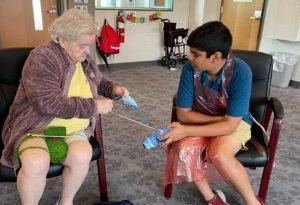
The Gateways Intergenerational Partnership is a collaboration between the Gateways Adult Day Center (GADC) and Alvirne High School in Hudson, New Hampshire. The adult day care facility, located within the Wilbur H. Palmer Career & Technical Education Center, offers opportunities for students to interact regularly with older adults.
Students from the Care and Support class, part of the Health and Human Services program, complete classwork and then walk across the hall to practice new skills, foster meaningful connections, and engage in mutual learning with older adults. Adult Day Care staff and teachers work together to plan and supervise intergenerational activities.
This unique partnership not only benefits the Adult Day Care participants, but it also introduces high school students to careers in Health and Human Services. A two-year certificate program is offered to juniors and seniors who are often hired by Gateways after graduation. Other students in the high school are also encouraged to interact with the participants of the Adult Day Care. Students from the Spanish Honor Society have taught Spanish to older adults, the high school jazz band has performed, and art students have been involved in special projects.
For more information, contact Michael Blau: mblau@gatewayscs.org
Video: https://www.youtube.com/watch?v=TyAnzBUCqc8
Intergenerational Connections to Fight Ageism Curriculum
The New York City Department for the Aging and the Department of Education have developed an anti-ageism educational program to help students recognize ageism and understand how they can challenge harmful stereotypes. The resource guide created by the Department for the Aging distinguishes between “structural” ageism in institutions like healthcare, and interpersonal ageism, which can include dismissive comments and stereotypes. The guide also includes suggestions for lessons, including oral history projects where students interview older adults about their lives, and videos that debunk some common stereotypes about older adults.
Over 30 elementary, middle, and high schools have piloted the curriculum, which involves classroom and service learning activities as well as recommendations for implementation. Now in its fourth pilot year, teachers who previously implemented the curriculum are helping orient new teachers. The New York Academy of Medicine has been selected to evaluate the program. Currently, the curriculum is only available to NYC Public Schools.
For more information, contact Jenine Ventura: jeventura@aging.nyc.gov
RESOURCES
Growing Up and Growing Older: Books for Young Readers©
https://library.lmunet.edu/booklist
A is for Aging, B is for Books
https://www.lindseymcdivitt.com/
How to Use Picture Books to Counter Ageism
Video: Intergenerational Practice in Action: https://www.youtube.com/watch?v=9eB_f353Al4
Generations Working Together: Learning through Intergenerational Practice www.generationsworkingtogether.org/downloads/5252d276ca45a-GWT%20brochure%20FINAL.pdf
Old’s Cool: Intergenerational Practice Toolkit
www.generationsworkingtogether.org/downloads/5b1e757652795-OLDSCOOL_TOOLKIT_.pdf
Generations Growing Together: Intergenerational learning as a pedagogical strategy in early childhood education and care services
Creating Intergenerational Connections Through Digital Storytelling
https://aiip.net.au/creating-intergenerational-connections-through-digital-storytelling/
Overcoming Assumptions: How to Facilitate Successful Multi-Generational Collaboration
Teaching Civics in a Divided Age? Intergenerational Dialogue Should Go Both Ways
Intergenerational programs: What can school-age children and older people expect from them? A systematic review by Caroline Giraudeau and Nathalie Bailly. (2019). European Journal of Ageing. https://pmc.ncbi.nlm.nih.gov/articles/PMC6728408/
Intergenerational Learning: Proven benefits for both elders and youth
https://crpe.org/intergenerational-learning/
Pathways to Success: K-12 Education Support for Kinship and Grandfamilies
https://www.gureport.org/2024-report
A Toolkit for K-12 School Professionals and Kinship Service Providers
https://www.gksnetwork.org/resources/education-toolkit/
NEWS FROM THE FIELD
Intergenerational Community Design Competition
The Intergenerational Community Design Competition will be held as a pre-conference event for the 2nd Mid-Atlantic Intergenerational Conference (June 3–5, 2026), hosted by Stockton University at its Atlantic City, NJ campus, in partnership with Penn State. Winning entries will be showcased at the conference.
With support from the Stuckeman School and the Hamer Center for Community Design (Penn State College of Arts and Architecture), the Competition provides an exciting platform for innovative community design. Click here to view the Submission Guidelines and access the Submission Form. Entry deadline: February 2, 2026. Don’t miss the chance to have your design featured at the conference!
Call for Papers – Journal of Intergenerational Relationships
Special Issue: Intergenerational Spaces and Places to Meet Demographic Challenges
Guest Editors: Mariano Sanchez, Matt Kaplan, and José-Manuel Sánchez-Martín
Abstracts are due by October 18, 2025. Please send your title, abstract (up to 150 words), and author information to marianos@ugr.es. Full manuscripts are due by January 31, 2026 and should be submitted through the Journal of Intergenerational Relationships submission site.
We welcome contributions that explore innovative approaches, research, and practices addressing intergenerational spaces in the context of demographic change.
This newsletter is presented as part of Generations United’s Shared Site Learning Network which is made possible with support from The Eisner Foundation.